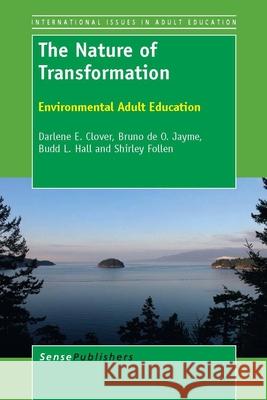The Nature of Transformation : Environmental Adult Education » książka
The Nature of Transformation : Environmental Adult Education
ISBN-13: 9789462091443 / Angielski / Miękka / 2013 / 140 str.
The Nature of Transformation : Environmental Adult Education
ISBN-13: 9789462091443 / Angielski / Miękka / 2013 / 140 str.
(netto: 181,41 VAT: 5%)
Najniższa cena z 30 dni: 180,57
ok. 22 dni roboczych.
Darmowa dostawa!
The Nature of Transformation: Environmental Adult Education is based on 15 years of educating for social-environmental change around the world. It is for adult and community educators, trainers, literacy and health care practitioners, social activists, community artists and animators, labour educators, and professors in higher education interested in weaving environmental issues in to their educational practice. It is also for environmental activists and educators who want to link social issues to environmental issues and problems. This book is a contribution to the discourse and practice of adult education in the community and/or the academy, aimed to respond creativity and critically the contemporary socio-environmental crisis and to encourage hope and a stronger sense of political agency through an ecological approach to teaching, and learning. The Nature of Transformation includes a discussion of key adult education theories we used to augment our educational practice, provides a plethora educational activities, shares workshop design considerations and some of the challenges we faced in our wok, as well as stories from adult and community educators around the world. The book concludes with a list of resources to enhance understandings of adult education theory and practice. The Nature of Transformation illustrates how to critically and creatively integrate the rest of nature, concepts of ecological and gender and justice, citizenship, critical environmental consciousness and activism into educating and learning in community settings, organisations, education institutions or workplaces. In particular, there is an emphasis on using the arts as a tool for learning and change. With its emphasis on acknowledging and confronting ecological oppression, working towards socio-environmental justice, ensuring hope and fun are integral to the learning process, encouraging defiance, agency and creativity, challenging assumptions, and helping people to find solutions environmental adult education is a valuable player in any pedagogical quest for change and transformation.
The Nature of Transformation: Environmental Adult Education is based on 15 years of educating for social-environmental change around the world. It is for adult and community educators, trainers, literacy and health care practitioners, social activists, community artists and animators, labour educators, and professors in higher education interested in weaving environmental issues in to their educational practice. It is also for environmental activists and educators who want to link social issues to environmental issues and problems. This book is a contribution to the discourse and practice of adult education in the community and/or the academy, aimed to respond creativity and critically the contemporary socio-environmental crisis and to encourage hope and a stronger sense of political agency through an ecological approach to teaching, and learning. The Nature of Transformation includes a discussion of key adult education theories we used to augment our educational practice, provides a plethora educational activities, shares workshop design considerations and some of the challenges we faced in our wok, as well as stories from adult and community educators around the world. The book concludes with a list of resources to enhance understandings of adult education theory and practice. The Nature of Transformation illustrates how to critically and creatively integrate the rest of nature, concepts of ecological and gender and justice, citizenship, critical environmental consciousness and activism into educating and learning in community settings, organisations, education institutions or workplaces. In particular, there is an emphasis on using the arts as a tool for learning and change.With its emphasis on acknowledging and confronting ecological oppression, working towards socio-environmental justice, ensuring hope and fun are integral to the learning process, encouraging defiance, agency and creativity, challenging assumptions, and helping people to find solutions environmental adult education is a valuable player in any pedagogical quest for change and transformation.











